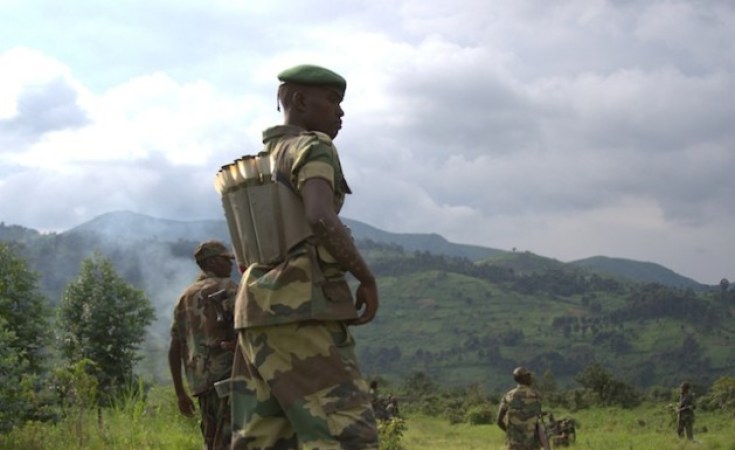Troops from the Southern African Development Community (SADC) deployed to eastern Democratic Republic of Congo (DRC) are struggling to restore peace and security to the restive region.
The Democratic Republic of Congo (DRC) is relying on its partners in the Southern African Development Community (SADC) to neutralize the M23 rebel group in Congo's conflict-hit east.
Tensions flared in March 2022 when M23, after a decade of relative calm, attacked Congolese army positions near the border between Uganda and Rwanda, causing locals to flee for their safety.
The SADC Mission in Congo, known as SAMIDRC, started deploying in December after Congo -- one of SADC's 16 members -- sought support under the bloc's mutual defense pact.
But the SADC's capacity to restore peace and security in eastern Congo is in question.
Lack of funds
According to analysts, a lack of funding for foreign soldiers is hampering the success of the mission in eastern Congo.
At the end of the day, the problem is "that these big, very expensive missions are not sustainable by the troop contibuting countries," said Stephanie Wolters, a senior research fellow at the South African Institute of International Affairs in Johannesburg.
Woters pointed at similar financial difficulties compromising the SADC's Military Mission in Mozambique (SAMIM), which has been assisting local forces since mid-2021 in their fight against Islamist terrorism in Mozambique's northern province of Cabo Delgado.
The SAMIM operation -- which involves troops from eight SADC countries: Angola, Botswana, Congo, Lesotho, Malawi, South Africa, Tanzania and Zambia -- will leave in July due to a lack of funds, according to a recent announcement by Mozambican Foreign Minister Veronica Macamo.
SADC has recognized that "we can effectively fight terrorism in Mozambique if other countries continue to support us with material, including lethal material," she said.
Will the EU maintain support for Rwandan deployment?
Mozambique has negotiated for South Africa and Tanzania to maintain forces as part of bilateral relationships, said Alex Vines, head of the Africa Programme at the UK-based think tank Chatham House.
Vines pointed out that there are still 2,500 Rwandan troops deployed in Cabo Delgado, a force that will maintain its presence for some years to come, Vines added.
But there is an ongoing debate in the European Union over whether its funding for the Rwandan deployment should be extented for another year, he said.
The European Union Training Mission in Mozambique has been supporting the deployment of Rwandan troops in Cabo Delgado since 2021.
According to Wolters, there is consensus in Mozambique that continued funding would be helpful if it allowed the SAMIM's mission to continue its manadate, without which there would be a vacuum.
Mozambican analyst Adriano Nuvunga agreed.
"I comment the troops and the mission, but the lack of funding is a major hurdle," said Nuvunga, director of the Centre for Democracy and Development, an Abuja-based NGO that prommotes democracy, peace and human rights on the continent .
The withdrawal of SADC forces could expose local Cabo Delgado communities to fresh dangers, Nuvunga added.
Eastern Congo a priority
The SADC also recognized that the situation in Mozambique is far more stable than the escalating violence in eastern Congo, where more than 120 armed groups have been fighting for a share of the region's gold and other mineral resources -- which include major deposits of copper, gold and diamonds -- committing mass killings in the process.
The result is one of the largest humanitarian crises in the world, with around 7 million people displaced, according to UN estimates at the end of 2023, including 2.5 million IDPs in North Kivu province alone.
The SADC deployment to eastern Congo is now the priority for the region and some of the assets that have been used in Mozambique have been redeployed there, said Vines.
"We will see how effective that force is but there is a danger in my view that SADC is directly confronting Rwanda," Vines told DW.
The African Union (AU) and the United States have accused Rwanda of backing the M23 rebels, claims that Kigali has denied.
In February, South Africa's government said that 2,900 of its soldiers were being mobilized for the SADC operation in eastern Congo, which has a mandate until December 2024, at a cost of around 2 billion rand ($105 million, €98 million).
"That still leaves quite a lot missing," she pointed out, adding that, up until now there has been a deployment of 800 South African troops as well as some Tanzanian and Malawian soldiers, which doesn't come close to the pledged force of 4,800, Wolters added.
"It is close to one fifth of the deployment of SAMIDRC and the situation is that the resources for a full deployment just are not there."
AU and EU funds are 'essential'
Political oberservs hope there will be additional funding coming from multilateral channels like the United Nations and the European Union to help fund SAMIDRC.
Congo is also using mercenaries and it has mobilized many of the armed groups that were fighting the Kinshasa government some time ago, Wolters said. Now they are part of the pro-government coalition fighting together with the Congolese army against violent rebel groups.
"But there is not any other regional body that the DRC could appeal to as it already did with the East African Community (EAC) and the SADC force," said Woters said, "so the finances from the AU and EU are pretty essential."
Edited by: Keith Walker
While you're here: Every weekday, we host AfricaLink, a podcast packed with news, politics, culture and more. You can listen to AfricaLink wherever you get your podcasts.


